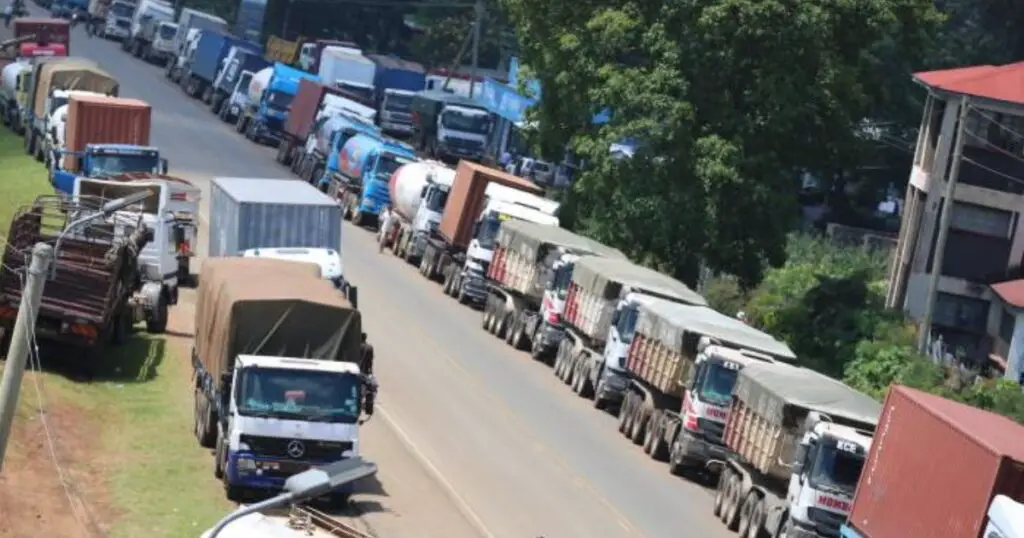- To ease the truck traffic snarl-up at the Busia, Malaba border, Uganda has committed to conducting free COVID-19 tests
- Uganda’s move follows a joint multi-sectoral virtual meeting of the Ministers responsible for EAC Affairs, Health and Transport convened by the EAC Secretariat
- There have been over 4,500 trucks have stalled at the border posts, because of the mandatory Covid-19 testing requirement introduced by Uganda on 20th December 2021
Uganda COVID-19 border tests
Uganda says it will conduct free COVID-19 rapid tests at the Kenya-Uganda border points of Busia and Malaba for seven days, to ease the truck traffic snarl-up that has disrupted intra-EAC trade on the Northern Transit Corridor.
According to the EAC Secretariate, the move follows a joint multi-sectoral virtual meeting of the Ministers responsible for EAC Affairs, Health and Transport convened by the EAC Secretariat.
The secretariate further revealed that there were over 4,500 trucks have stalled at the border posts, because of the mandatory Covid-19 testing requirement introduced by Uganda on 20th December, 2021.
Uganda’s move deviates from the 14 days COVID-19 testing period, previously agreed at the regional level and monitored through the Regional Electronic Cargo and Drivers Tracking System (RECDTS).
The multi-sectoral Ministerial meeting agreed that the Partner States should always notify each other in
case of any deviations from the agreed protocols relating to measures against COVID-19.
Commenting on the announcement, Adan Mohammed, Chair of the EAC Council of Ministers and Cabinet Secretary, Ministry of East African Community and Regional Development, Kenya said the move would mitigate the impact on the movement of goods, persons, workers and services across the region.
The stakeholders further directed Partner States to recognise certificates from accredited/national recognised laboratories with a validity of 14 days for fully vaccinated truck drivers and 72 hours for unvaccinated truck drivers moving goods across the region.
Further, they agreed that Partner States should implement the EACPass too fast-track verification of
Covid-19 test results.
“The EACPass is a system that integrates all EAC Partner States’ negative test results for Covid-19 and
those vaccinated and can be easily accessed on the mobile phone. It will ease the turnaround time at
border points,” said EAC Secretary-General Peter Mathuki.
Virus update: COVID-19 induced East Africa’s border saga
The 21st Meeting of the Sectoral Council of Ministers responsible for Health held on 10th December,
2021 approved the EACPass as a regional platform to facilitate the movement of all travellers in the region
and beyond and also directed EAC Partner States to facilitate the implementation and use of the
EACPass as a platform for quick verification of Covid-19 test certificates and vaccination status for
travellers.
CS Mohamed said that a follow-up meeting to review the situation will be held on Friday, 14th January,
2022 to further deliberate on regional Covid-19 measures to ease movement of persons and flow of
goods in the region.

Uganda has committed to conducting free Covid-19 rapid tests at the Kenya-Uganda border points of Busia and Malaba for seven days. Photo: International organisation of migration.
Barely a week ago, the East African Business Council urged EAC Partner States to adopt and implement EAC coordinated approach on COVID-19 to eliminate COVID-19 related Non-Tariff Barriers and spur trade.
The council asked EAC Partner States to mutually recognise COVID-19 test and vaccination certificates through the EAC Pass and eliminate the need for confirmatory testing and quarantine for persons with valid COVID-19 test and/or vaccination certificates.
This came when Uganda had just introduced new COVID-19 mandatory testing of truck drivers entering or transiting through the country, which had highly hampered the smooth flow of cargo across the region.
The measure mandated truck drivers to pay a US$30 COVID-19 test each time they cross into Uganda increasing the cost of doing business and resulting in traffic pile up at the border posts plus increased turnaround times and demurrage charges.
The council also urged Partner States to embrace the Regional Electronic Cargo Driver Tracking System (RECDTS) to accommodate the emerging COVID-19 trends as it offers minimal disruptions to the private sector, especially the transport and logistics sector.
“EABC is committed to continuing engaging the EAC via the Technical Working Group and respective inter-ministerial teams to adopt and implement an EAC coordinated approach on COVID-19 measures, procedures and protocols”
EAC partner states adopt electronic cargo system











